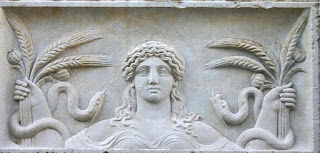What do we want when we read fantasy? For a lot of readers, it's the chance to identify with powerful characters. Wizards, warriors, angels, aristocrats, vampires, demigods, one of the most popular tropes in fantasy is the powerful figure with a deadly flaw. We love characters who may have something to fear, but who are nevertheless able to influence the world around them in ways that are often impossible for us.
For others, fantasy is comfort reading. They want the tropes they grew up with, familiar settings and characters: school stories, noble elves, adventurers in a dungeon.
But there's another, more interesting urge: The desire for a wider world, a bigger, stranger place than our familiar neighborhood. The chance to explore. Places that are weird but make sense, that have stories to tell other than the ones we've heard. You can fill that urge with good historical fiction. Sometimes, in fact, it fulfills that need better than fantasy.
Consider the opening lines of Mary Renault's novel The Last of the Wine: When I was a young boy, if I was sick or in trouble, or had been beaten at school, I used to remember that on the day I was born my father had wanted to kill me. You will say there is nothing out of the way in this. Yet I daresay it is less common than you might suppose...
"Yet I daresay it is less common than you might suppose." Did that grab your attention? It's not there just for shock value. It's a fair representation of an attitude common to an entire society. Renault goes on to build out that society, a genuinely civilized world with values profoundly different from our own - the world of Classical Athens, at the height of the Peloponnesian War.
In the next chapter, the protagonist Alexias has a religious experience while standing in the temple of Athena Parthenos, the Parthenon, and looking out over his city. Renault describes in gorgeous, goose-pimple prose a moment of worship that no Christian or Muslim would ever have; an experience that is completely pagan, but no less valid for that.
Harlan Ellison once said, "Reading is about drinking strange wine" - finding the stuff that challenges you, that is alien to your experience, that opens your eyes. I write fantasy and science fiction, but I'm telling you, you don't have to read SFF to drink strange wine.

No comments:
Post a Comment